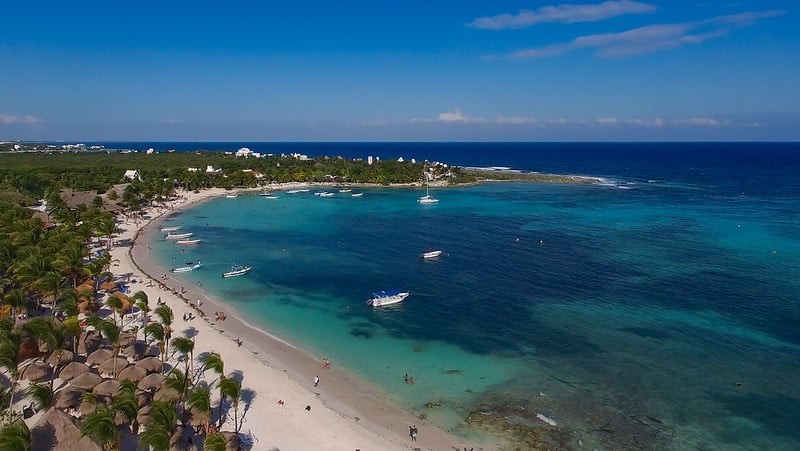The Ultimate Guide to Akumal

Despite its small size, Akumal attracts a similar number of visitors each year, comparable to that of bigger cities around the Riviera Maya thanks to the experiences it has to offer. One of which, you can’t find anywhere else.
Where is Akumal?
Highway 307 is well-known by tourists, not only because it links Quintana Roo’s most popular cities, like Playa del Carmen and Cancun, but there are many interesting spots alongside it, too, like cenotes, eco-parks, and more. Akumal is also on this road.
There are a couple of ways to get here. Colectivos—small, public vans that hold around 20 people—constantly drive up and down highway 307 and go through Akumal. The obvious disadvantage is that you won’t have a car to move around in. For that reason, many choose to rent a car in any of the neighboring cities and drive to Akumal.
Highway 307 runs through the town. One side, to the southeast, is considered the tourist area as that’s where most tourist attractions are, as well the hotels. Plus, Akumal’s biggest selling point: Akumal Beach, where you can swim with sea turtles.
At the other side of the highway, to the northwest, lies the town. Life here is more quotidian, with everyday businesses and places to eat—this is where the locals live, after all. It’s not unheard of, however, that tourists stay on this side of the road, as here, lodging is a bit cheaper.
Staying in Akumal
There are several options for staying at Akumal, depending on how much you’re willing or able to spend. You shouldn’t have a problem finding an Airbnb apartment or room. Most are close to the coast and, therefore, not cheap: $50 USD and above a night, but there are a couple in the town side of Akumal that are a bit cheaper: around $30 USD a night.
It’s the same story with hotels in Akumal. Those in the town are generally cheaper, like El Ultimo Maya and Sak Naj, both of which charge a bit over $50 USD a night. If you’d like to camp in the jungle with all the amenities of a hotel, the Akumal Natura Glamping registration office is in-town as well.
Hotels closer to the ocean are more expensive. There are all kinds of lodgings, from bohemian cabins to fancy hotels. Their prices range from $150 USD, like the rooms in Del Sol Beachfront Condos and Hotel, to the $500 USD of Secrets Akumal Riviera Maya’s.
Yal-Ku Lagoon
Only a few minutes away, Yal-Ku is one of Akumal’s main attractions. Some call it a lagoon, others a cenote because it looks like both. It’s in the middle of the jungle and it’s open to the sea. But what attracts visitors is its beauty, rather than what it’s officially classified as.
There are a couple of places—both named Yal Ku—where you can find cenote-style facilities, like a parking lot, bathrooms, changing rooms, and lifejacket and snorkel rentals. One even has a restaurant.
Snorkeling is the name of the game at Yal Ku, a place to see the animals and vegetation under the surface. One interesting thing about this place: the freshwater from the underground rivers and cenotes clashes with the ocean saltwater. When your vision becomes blurry, you know you’ve reached their meeting point.
Akumal Monkey Sanctuary
If it’s animals on the surface you’d like to see, you can pay a visit to the Akumal Monkey Sanctuary. This place rescues monkeys from difficult and often dangerous situations, like circuses—which are no longer legally allowed to carry shows with animals—and takes care of their every need. Though it started out as a monkey sanctuary, they began accepting other kinds of animals after a while, and now they have a wide variety of them—and you can interact with a few.
Akumal Beach
There are not many beaches in Akumal, and most are rocky reefs where the waves crash. Unless you’re a local, you’ll have to pay around $5 USD to visit Akumal Beach, but it’s worth it. It is small and picture-perfect, though it can get a bit crowded. Although the waters are generally calm, you’re only allowed to swim a few yards into the sea. That’s because, further away, you’ll find Akumal’s main attraction.
Swimming with turtles
Many flock to Akumal for the opportunity of swimming with the sea turtles that, until then, they’ve only read about and seen in pictures (and one or two animated films).
Besides your access to the beach, you’ll have to pay an extra $25 USD for the sea turtle guided tour. Buoyed ropes outline a circuit around the bay’s deepest waters where visitors can see and swim next to these interesting animals, as well as others, like several species of fish and rays. There are strict rules against touching the animals or following them for long periods, so make sure you follow them.
